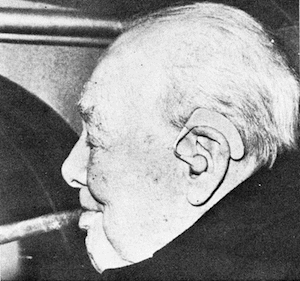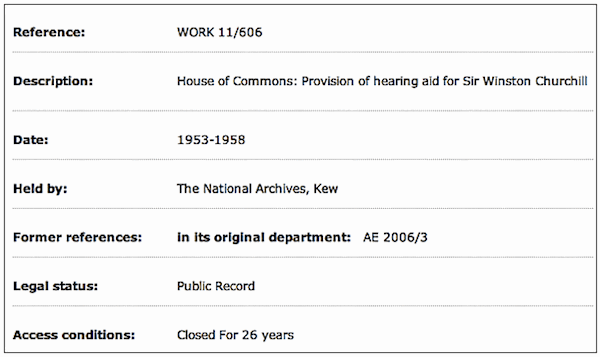Sir Winston Churchill (1874-1965), who served as Prime Minister of the United Kingdom from 1940 to 1945, and again from 1951 to 1955, is widely regarded as one of the greatest wartime leaders of the 20th century. He was also a British army officer, historian, writer, Nobel Prize winner in Literature, artist, and the first person to be made an honorary citizen of the United States. A complete rendering of his positions and accomplishments would require a book, of which there are many. My interest here relates specifically to his use of a hearing aid (hearing aids, plural, were not fitted at that time).

Figure 1. England’s Sir Winston Churchill has added a new trademark to his famed stogie, a light-weight, over-the-ear hearing aid.
Churchill’s Attitude Toward Hearing Loss
Like many individuals who find their hearing deteriorating, Churchill was not eager to discuss or admit that his hearing was deteriorating. That determination has been made based on comments and actions associated with his listening behavior.
Churchill makes no mention of his hearing loss in any of his voluminous published works, nor did his earlier biographers, except to discuss it as an adjunct to his old age. Perhaps the first good article summarizing Churchill’s hearing loss was written by Dave Bakker in 1995{{1}}[[1]]Bakker, D., 1995. Hearing Health, April/May, pp. 20-22[[1]]. Much of the information related to Churchill’s hearing loss comes from the diaries written by his personal physician between 1940 and 1965, Sir Charles Wilson, M.D., in “Churchill: Taken from the Diaries of Lord Moran” (Lord Moran was Sir Charles Wilson). Bakker nicely located excerpts from this publication and summarized the following comments.
The first instance Dr. Wilson notes of Churchill’s hearing impairment was on December 24, 1944 when he recalls receiving a phone call from Churchill during which the Prime Minister is quoted as saying, “’I can’t hear.” With angry resignation, “I can’t hear a word you say!’” Dr. Wilson again notes telephone problems on December 7, 1947: “…one day he telephoned me in London. The line was bad and he is a little hard-of-hearing.”
By June 21, 1950, the hearing loss was sufficiently pronounced that Dr. Wilson took his patient for testing by Sir Victor Negus, consulting surgeon to the Ear, Nose, and Throat Department of King’s College Hospital. He found a high-frequency hearing loss.
In 1951, following Churchill’s second election to the office of Prime Minister, Dr. Wilson noted in his diary, “The election has played the devil with Winston’s hearing; his deafness has been much worse during the past fortnight. ‘It is a bloody nuisance,’ he said sulkily. I advised him to see Victor Negus, but he preferred to call in another ear surgeon who had good hands and a reputation for skillful technique. …Winston’s man always has an explanation for everything; above all always does something. So, Winston likes him. He will send for him just before he has to make a speech; he pops in and sprays his throat (with normal salt solution); it seems to give him confidence that his voice will not fail.”
Wilson continued, “Negus, on the other hand, is dour and taciturn, with the scientific habit of mind, which is rare in any doctor. …I have complete confidence in his opinion, but he has made no impression on Winston. …Winston’s man saw him first. He did not wait to test whether his hearing was in fact worse; the deafness was, he said, probably due to wax. But when he syringed his ear no wax was found.”
The following morning Dr. Wilson brought Dr. Negus to No. 10 Downing Street, the official residence of the Prime Minister. He recalls, “In the car I said to him, ‘Why should Winston’s deafness suddenly get much worse?’ ‘That’s the point,’ he answered. ‘It may be that when I test his hearing with an audiometer I shall find no deterioration at all; he may be suffering only from fatigue of his perception, due to the strain of election. If so, his hearing will improve, and his deafness will be no worse that it was when I tested his hearing eighteen months since.’ And, it proved to be, but Winston was not impressed. He remains faithful to his cheerful and talkative empiric.”
By June 6, 1955, Dr. Wilson noted, “It does not seem a long time since Winston did all the talking at every meal; now he sits all huddled up in silence; he can no longer hear what is being said, he is outside the round of conversation and not a part of it, though at times, it is true, when there is a burst of laughter, someone will explain to him what it is all about.”
On May 8, 1958, Dr. Wilson’s final diary annotation of Churchill’s hearing impairment says: “We have been given by accident an opportunity of measuring by an audiometer the exact degree of his deafness. Something went wrong with the wiring mechanism at the House of Commons, and Winston, who had no knowledge of this, noticed a sudden increase in his difficulty in following the debate. …I seized the opportunity to bring in Sir Victor Negus. Hitherto, our combined efforts to get Winston to use a hearing aid have come to nothing; he would not persevere with any instrument. Now we have the dining room at Hyde Park Gate wired exactly like the House of Commons. When all was ready, Clemmie (Churchill’s wife, Clementine) produced Winston. He was able to hear what she said, even when she spoke in a low voice, and was ready to admit that this was a great advance. Before he left the room he told Negus to go ahead with the wiring.”
Editor’s Note: It is not clear what this wiring entailed. Some have speculated that it may have been some kind of early induction loop system, but since Churchill was not wearing anything at the ear, others have speculated that it may have been a basic hard wire system from a close proximity microphone to a small speaker placed within easy listening distance. Regardless, Churchill seems have been enamored with the concept and had it installed in his home as well after he retired.
Churchill and Hearing Aids
Churchill was diagnosed with high-frequency hearing loss in 1950. What might be Churchill’s first public showing of his hearing aid is recorded in Figure 2, an article in the Eugene Register-Guard, April 21, 1952{{2}}[[2]] https://news.google.com/newspapers?nid=1310&dat=19520421&id=mCJWAAAAIBAJ&sjid=tOIDAAAAIBAJ&pg=5444,4440446[[2]].

Figure 2. Initial newspaper comments about Churchill’s hearing aid. Eugene Register-Guard, April 21, 1952.
When President Eisenhower was elected in 1952, Churchill made haste in arranging a meeting with the new leader in hopes of establishing a stronger relationship with the United States. This would prove nearly impossible though, due to Churchill’s age. Churchill was beginning to show signs of aging, and allegedly refused to wear his hearing aid while in meetings, causing the conversations to be carried on at a screaming volume.
Finding a photograph with Churchill wearing a hearing aid is even more difficult. However, I found the photograph shown here in a 1959 Spring issue of Hearing Progress (Figure 1). It is not possible to identify the hearing aid brand being worn in the photograph. It resembles a number of hearing aids being marketed at that time – a large behind-the-ear (BTE) hearing aid using an external receiver and an ear coupler (not identified, but assumed to be a custom earmold).
Winston Churchill was initially a customer for hearing aids developed by the Poliakoff business. However, in 1953, the Churchill contract was summarily terminated. The likely cause became known only much later. It seems that M15 (the British intelligence agency working to protect the UK’s national security) had been keeping the Poliakoff family under surveillance in light of that company’s long-standing links with the Soviet trade delegation, and feared that Churchill was being bugged. An authorization for hearing aids was then tendered by the House of Commons (Figure 3){{2}}[[2]] https://discovery.nationalarchives.gov.uk/SearchUI/Details?uri=C3721971[[2]]. It is interesting to note that access to this work order was to be held confidential for 26 years. Therefore, it is doubtful if the hearing aid shown in Figure 1 was made by the Poliakoff Company.







